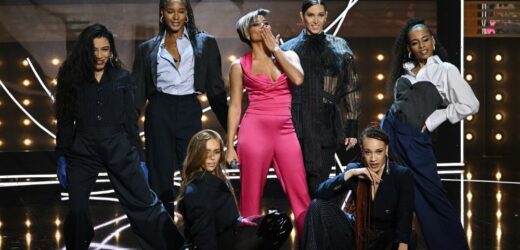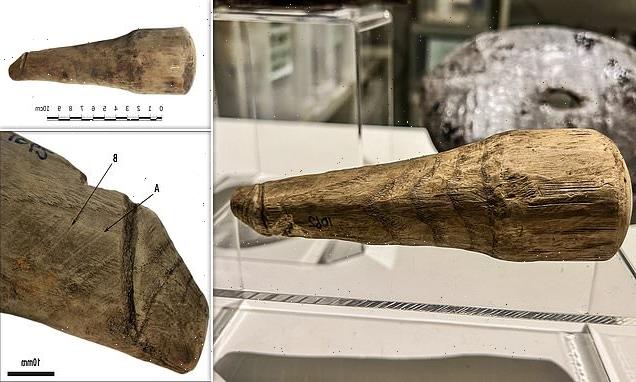BAFTAs awards producer Nick Bullen believes Twitter criticism of Ariana DeBose’s opening number at Sunday’s awards show was “incredibly unfair.”
Speaking to Variety the morning after the telecast, the producer — who was backstage during the London awards ceremony honoring the best movies of the year — shared that the “West Side Story” star “put the whole piece together” with her team, working closely with a musical director and choreographer, and didn’t deserve the vitriol.
DeBose and her back-up dancers burst onto the stage following host Richard E. Grant’s opening monologue. Belting out “Sisters Are Doing It For Themselves” and “We Are Family,” the singer transitioned into an original rap saluting the awards’ female nominees.
“Angela Bassett did the thing, Viola Davis my ‘Woman King,’ Blanchett Cate you’re a genius, Jamie Lee you are all of us,” sang DeBose, who danced her way around the front row and was a little out of breath at some points. While the lyrics felt clumsy to those watching at home, and a clip of the lyrics played nonstop on Twitter last night, the mood inside the room was more celebratory. Speaking to co-host Alison Hammond backstage later in the show, the Oscar-winning singer was clearly pleased, telling the host she “made the British people clap.”
However, the song immediately received backlash online from viewers who branded it as “painful” to watch. Bullen, CEO of British production company Spun Gold, says the trolling “is incredibly unfair, to be frank.”
“We wanted to open the show with some energy, some fun, and also lay out straight away that this was hopefully going to feel like a different night, but with a familiarity as well, and what Ariana did was exactly that,” says Bullen.
“I think a lot of people don’t like change, and there’s a view that the BAFTAs have to be this slightly stiff, traditional British, middle-England messaging. But American awards shows have much more razzmatazz, much more showbiz, and perhaps a broader range of people being involved. We felt we’re not about revolution, we’re about evolution.”
Spun Gold won the two-year contract to produce the BAFTAs in late August, and began planning the show in October. The Academy had already booked Royal Festival Hall — migrating away from the stately Royal Albert Hall — so “that’s the venue we [had] to work with,” says Bullen.
“Our brief from BAFTA and the BBC was they wanted the show to feel as though it had more energy, had more warmth, had a broader reach in terms of age range and diversity,” says Bullen.
The producer caught up with Variety to discuss the show’s biggest moments, including DeBose’s opener, how Carey Mulligan (“She Said”) was accidentally read as the winner for best supporting actress instead of “Banshee of Inisherin’s” Kerry Condon, a tribute to Queen Elizabeth with Helen Mirren and going live on the BBC for the first time.
Congratulations on a successful show. I was in the room, and could immediately see the difference, and how much more intimate the awards felt from past years. How much of that was the smaller venue, and how much was intentional?
I spent most of my night backstage, and all the feedback I was getting from the citation readers, winners coming through, and the stars going into Alison Hammond’s studio, was that the show felt warm, charming, and that there was joy in the room. I think that emanated from Richard. He was nervous, but people were really with Richard in the room and the charm started with him. Baz Luhrmann said at the end of the show, when they were doing the lineup to meet the Prince and Princess of Wales, that he felt it’s been a great show. So you know, Baz Luhrmann, one of the greatest showman in the world telling me that? I’ll take it.
Let’s talk about the opener. What do you make of the Ariana DeBose backlash?
I think it’s incredibly unfair, to be frank. I absolutely loved it. Everybody I’ve spoken to who was in the room absolutely loved it. She’s a huge star, she was amazing. The songs she was singing are very familiar songs, the room was clapping, and people were sort of dancing to the music. That rap section in the middle, mentioning the women in the room, was because it’s been a great year for women in film, and we wanted to celebrate that. And here is a woman of color who is at the absolute top of her game. And she’s opening the BAFTAs with a song that said so much on so many levels. All of those mentions, I felt, from the moment we were rehearsing it right through to the transmission last night, spoke to what we wanted to do.
Did Ariana write the lyrics herself?
She only had a few weeks to put this whole thing together. She worked with a great musical director and choreographer. So it was a real team effort. She had an amazing team around her, and she and her team put the whole piece together.
Do you think the backlash comes down to a bit of a culture clash? Or that people only saw a short clip not the whole performance?
I think a lot of people don’t like change, and there’s a view that the BAFTAs have to be this slightly stiff, traditional British, middle-England messaging. But American awards shows have much more razzmatazz, much more showbiz and perhaps a broader range of people being involved. We felt we’re not about revolution, we’re about evolution. Let’s just evolve, let’s just move forward with some gentle changes that start to lay out the stall of what this show should be and where we should be with it. Because we want to engage all audiences. We don’t want to just go for the traditional British award ceremony audience. The social media presence was incredibly important to us. The messaging to younger people was important to us. The messaging to the diverse groups around Britain was important to us. We wanted to get the message out there that this is a show for everybody. And I think some people don’t like that change, but you know what? You need to get with it because changes are coming.
The supporting actress mix-up was edited out of the BBC broadcast so people at home didn’t see Carey’s name being read by mistake. But what exactly happened in the room?
It was just a very unfortunate translation issue. [Troy Kotsur] was signing in [American Sign Language]. And on stage we had someone with him signing in [British Sign Language]. And on the floor was someone with a mic translating the sign language to speech. And it was a very unfortunate mistranslation that played out. It was just one of those – Kerry Condon and Carrie Mulligan. Somewhere in the signing translation, pardon the pun, something was lost in translation, which was incredibly unfortunate. But I thought Carey Mulligan was incredibly gracious and handled it brilliantly. She understood it was one of those very unfortunate moments that no one could have predicted.

Did Carey make a move to get up and accept the award, or was it clear to her Kerry had won?
I don’t know because I was backstage, but my understanding is that Kerry Condon’s name came up on screen but the translator called out Carey Mulligan. So talking to Kerry Condon afterwards, all of her cast she was sitting with, from “Banshees,” they said to her, “No, you’ve won, you need to go up,” which is why she made the move to go up. And I think Carey Mulligan realized what had happened because she didn’t get up from her seat. But I was backstage so I didn’t actually see what happened, but this is what I’m getting from the debrief.
The papers and social media have been very sort of generous with it, because they realized that everybody was trying our best to be as inclusive as possible with ASL and BSL. And Troy obviously realized what the mistake was because if you notice, he held up the card. So I think it’s one of those things that people have understood that it was all done with the best intentions, but unfortunately, there was a slip up.
But Troy signed the correct name?
Yes. From my understanding.
You did have some elements that did harken back to the BAFTAs of old, such as the tribute to the late queen. Was that done primarily because Prince William and Kate were in the audience after a number of years away?
It was part of our pitch, actually, when we were talking about doing the show. Spun Gold has worked a lot with Helen Mirren a lot in the past, on all the Jubilee shows that we’ve done with the queen. When we were pitching for the show, the queen had recently died. The show was going to be broadcast in a coronation year. And at that point, we didn’t know whether the Prince and Princess of Wales were attending or not. So it just felt right that, this year, it was the moment to pay tribute to the queen, because people don’t recognize or remember how instrumental she was in supporting the British film, and music and arts industry. When the 1969 documentary “The Royal Family” went out, it was an incredibly profitable documentary, and the queen donated all of those profits to BAFTA in the late ‘60s, at a time when BAFTA really needed money. What she did for BAFTA at that point was quite frankly needed. And I think we felt the BAFTA should pay tribute to her. And then the fact that the Prince and Princess of Wales were in the room of course gave an added poignancy.
I was curious why you didn’t have that tribute alongside the In Memoriam segment?
It was just a case of lightening the chain. It’s a case of having a slightly more natural ebb and flow to the show. We just felt that too much in one place probably wasn’t the right thing.
And then you have the small task of going live for the first time in BAFTA history for those final four categories. Talk me through the logistics of pulling that off.
The skill of Lee Connolly and Moira Ross, who were running the show, all praise has to be placed with them, because it was an incredibly nerve-racking moment for everybody involved. It had lots of layers to it. We had to make sure that all the preceding awards before those final four ran as close to time as possible because we have to obviously hit certain junctions. And then, there are a lot of awards given in the room on the night as part of a three-hour show, that has to be condensed into a two-hour transmission slot. So there’s the packaging of a number of awards that are presented earlier in the night that don’t make the full transmission. And I can tell you now, there was a moment in the night where the AVID in the truck that was packaging the other awards crashed. And we made it to air with that package with 10 seconds to spare. It was absolute heart in your mouth in that truck. But it’s all credit to the team in the trucks that shows you, when you’re in the hands of great professionals, you can do it.
Given what happened with the Oscars and Will Smith’s infamous slap, how did you ensure nothing like that would happen at the BAFTAs?
You can’t really plan. We had a lot of contingency plans if things changed, or there were moments on stage that we needed to cut away from. But again, it was really about the tone of the show, the writing of the show. The Dawson Brothers, who worked very hard on the script, they worked with Richard and Allison to make sure that the tone wasn’t going to be offensive to people. It was a warm night, and if you set out to have a warm night, hopefully that translates to the audience and people don’t get on stage and slap each other.
So what’s your plan for the next iteration of the awards? What’s next?
We have a two-year contract so we have the TV awards coming up in a few months’ time. And then we’re back with the film awards next year. We learned a lot last night, and there will be a big debrief meeting with the BBC and BAFTA. But as it stands this morning, we’ve had fantastic response from the BBC. They are thrilled with the show. BAFTA loved the show; I heard from lots of the heads of BAFTA last night to say they loved it. And all the feedback I’m getting from the people who were in the room, they loved the experience last night. Everyone was saying it felt warm, charming, engaging. There will always be detractors with these things, but on the whole, the feedback we’re getting from viewers is that they loved the show. It peaked with 3.3 million viewers on the overnights last night, so the audience numbers were good.
Read More About:
Source: Read Full Article


